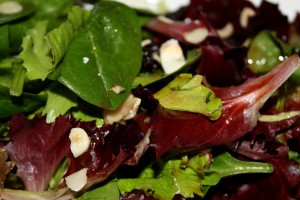I doubt there are many of you who don’t remember the pure horror of being told to ‘eat your greens’ by beady-eyed elders at the dinner table, circa 1995? Okay, okay: I don’t know when you, dear reader, were five years old. But I’m pretty positive there must have been a moment when the grotesque swamp-weeds sitting on your plate were apparently the only obstacle between you and a delightful treat (dessert, late nights, etc). Be it broccoli, cabbage or even the dreaded Brussell’s sprouts, I’m sure no child goes without a phase of vehemently protesting the consumption of anything naturally snot-coloured. I sure did.
 But, like lugging your favourite plush toy everywhere and watching the same episode of ‘Fireman Sam’ over and over again, I do hope you grew out of it. Or at least learnt to play it down. Because now that we’re, y’know, adults (dun dun dun), it’s time to face facts: you need to eat greens. It helps if you like them, but eat them you must.
But, like lugging your favourite plush toy everywhere and watching the same episode of ‘Fireman Sam’ over and over again, I do hope you grew out of it. Or at least learnt to play it down. Because now that we’re, y’know, adults (dun dun dun), it’s time to face facts: you need to eat greens. It helps if you like them, but eat them you must.
In particular, I’m talking about the cruciferous family of vegetables – basically, anything green and leafy. Broc, cauliflower, sprouts, spinach, bok choy, and the mother of all veg: kale (one of these days I shall write an ode to kale in the ‘Recipe’ section – stay tuned). These vegetables are abundant with goodness, storing a potent cocktail of vitamins and minerals – full of soluble fibre, and enough vits to make your daily multivitamin squirm. As if that weren’t enough, these little beauties also happen to be teeming with phytochemicals. Technically, a phytochemical is a biologically active compound found in plants, but as it turns out, many of them have powerful health benefits.
So, without further ado, SJ is telling you eat your veg – and here are five very good reasons why.
1. Green veg reduce your chance of cancer.
It’s them phytochemicals at work here – turns out they hate cancer just as much as we do and they do all they can to stop it. One of the phytochemicals found in cruciferous vegetables – sulforaphane – can stimulate enzymes in the body that detoxify carcinogens before any cell damage can occur. And it doesn’t stop there. Two other compounds found in cruciferous vegetables – indole 3-carbinol and crambene – are also suspected of activating detoxification enzymes. As Dr. Fuhrman (author of ‘Super Immunity’ and other titles) noted: “studies show that women who eat more cruciferous vegetables are less likely to be diagnosed with breast cancer … in a recent Chinese study, women who regularly ate one serving per day of cruciferous vegetables had a 50% reduced risk of breast cancer”. A coincidence? Nope. Cruciferous veg contain phytochemicals that are effective in blunting the growth-promoting effects of of hormones like estrogen on cancer cells. These phytochemicals (isothiocyanates or ITCs) also appear to be useful in removing estrogen and other hormones from the body, thus making them particularly excellent choices for preventing hormonal cancers (such as breast cancer).
2. Green veg reduce your risk of heart disease.
Alongside cancer, heart disease is up there with the most common causes of death in the US – and cruciferous vegetables have been proven to work their magic on your heart health, too. The anti-inflammatory properties of sulforaphane is of particular interest: in some individuals susceptible to high blood sugar, sulforaphane may be able to prevent (or even reverse) some of the damage to blood vessel linings that can be caused by chronic blood sugar problems. Decreased risk of heart attacks and strokes may also eventually be linked in a statistically significant way to the intake of cruciferous vegetables and their unique anti-inflammatory compounds. Plus, almost universally it has been acknowledged that increased intake of greens – coupled with a decreased consumption of animal products – has a hugely beneficial effect on blood pressure.
3. You’ll stay younger for longer.
For a long time it was thought that antioxidants were the key to younger skin – well, that means eating more fruit and veg, right, so of course that makes sense. But now it seems that there’s a fresher, more up-to-date theory on the scene (natch): Nrf2. Of course, cruciferous vegetables are absolutely rife with this stuff. Basically, Nrf2 is a complex protein has the ability to activate the body’s own broad array of protective compounds (‘survival enzymes’) – the same way as it did when the body was young. Bam: less wrinkles, better health.
4. You’ll get less colds!
So we already know that green veggies are awesome diet ninjas. But not only do they reduce your chances of cancer and heart disease, it turns out Broccoli and Co are pretty vital bunch when it comes to fighting off colds and flu, too. Remember those ITCs we talked about? Well, they happen to heighten the body’s cell-killing capacity – thus upping the body’s resistance to viral infection. Want a more detailed explanation, science nerds? Click here for more info.
5. They’re the original ‘diet’ food.
It’s tempting to go for ‘diet’ products that promise fewer calories, but often these foods are highly processed and pumped with artificial sweeteners and all sorts of nutrition-less mumbo jumbo that isn’t serving the best interests of your health at all. Cruciferous veggies, however, are unanimously low in calories but loaded with goodness – there’s no catch. Instead of a bag of crisps or a bar of chocolate, why not try eating a bowl of freshly steamed broccoli as a snack? At 34 calories per 100g (compared to 185 calories per 35g of salt-and-vinegar crisps), it’s a no-brainer … and a delicious alternative, too.
 Supplement Judge Unbiased Supplement Reviews – Do they really work??
Supplement Judge Unbiased Supplement Reviews – Do they really work??




